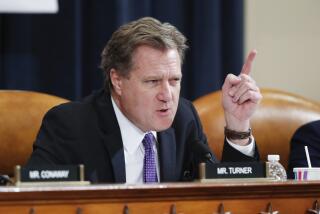Letter said CIA image to suffer if tapes trashed
More than two years before the CIA destroyed interrogation videotapes, top officials were urged to preserve them by a senior lawmaker who warned that disposing of the recordings would “reflect badly on the agency.”
The warning came in a February 2003 letter from Rep. Jane Harman of Venice, then the top Democrat on the House Intelligence Committee.
The letter was released publicly by Harman’s office on Thursday, after its contents were declassified by the CIA, and one day after the Justice Department opened a criminal investigation into the destruction of the tapes.
The existence of Harman’s letter had been reported; but its precise contents, previously unrevealed, provide details on then-classified discussions between the CIA and senior members of Congress about the tapes and the agency’s desire to get rid of them.
Harman wrote the letter after learning in a classified briefing that the CIA planned to destroy the tapes. She urged the agency to reconsider. “Even if the videotape does not constitute an official record that must be preserved under the law, the videotape would be the best proof that the written record is accurate, if such record is called into question in the future,” she wrote.
The letter was addressed to the CIA’s general counsel at the time, Scott W. Muller.
Harman’s letter refers to a classified briefing in which Muller told panel members that the CIA had used “enhanced techniques” in interrogating Al Qaeda suspect Abu Zubaydah. Zubaydah, who was captured in Pakistan in 2002, was subjected to interrogation methods including “waterboarding,” in which a prisoner is made to feel that he is drowning.
“You discussed the fact that there is videotape of Abu Zubaydah following his capture that will be destroyed after the [CIA] inspector general finishes his inquiry,” Harman wrote. At the time, the inspector general’s office was examining the detention and interrogation programs.
The advice that Muller and other administration lawyers offered on whether the tapes could be destroyed is likely to be a major avenue of inquiry for John H. Durham, the federal prosecutor named Wednesday to head the investigation.
Federal courts in Washington have ruled that government lawyers cannot assert the attorney-client privilege to avoid testifying in grand-jury and other proceedings about advice they gave.
Those rulings, which emerged during the myriad investigations of the Clinton administration, mean that Muller and other lawyers who once served on the Bush team, including former Atty. Gen. Alberto R. Gonzales and former White House Counsel Harriet E. Miers, would have to submit to questioning from Durham’s task force.
Stephen Gillers, a legal ethics expert at New York University law school, said it would be hard to prosecute the lawyers themselves for their legal advice unless there was evidence that they had participated in or actively urged destruction of the tapes.
However, the lawyers had no independent obligation to take possession of the tapes to ensure that they be preserved, Gillers and other experts said.
Under federal law, it is obstruction of justice to destroy evidence that might be relevant not only to a pending official proceeding but to one that is reasonably foreseeable. At the time the tapes were destroyed in late 2005, Congress was already moving to broaden restrictions on the sort of aggressive interrogation techniques that the tapes portrayed.
“Clearly, White House officials were involved in discussions regarding the disposition of the tapes,” Harman said in a written statement Thursday. She added that “Congress needs to know why key committees may have been misled about their existence and not told they had been destroyed.”
In her letter, Harman noted that Muller had assured members that the Justice Department and White House had sanctioned the legality of the detention and interrogation program. But she questioned whether employing harsh methods was “consistent with the principles and policies of the United States.”
In a February 2003 letter responding to Harman -- also released Thursday by Harman’s office -- Muller said he could not comment on administration deliberations but “I think it would be fair to assume that policy as well as legal matters have been addressed within the executive branch.”
--
rick.schmitt@latimes.com
More to Read
Start your day right
Sign up for Essential California for news, features and recommendations from the L.A. Times and beyond in your inbox six days a week.
You may occasionally receive promotional content from the Los Angeles Times.






